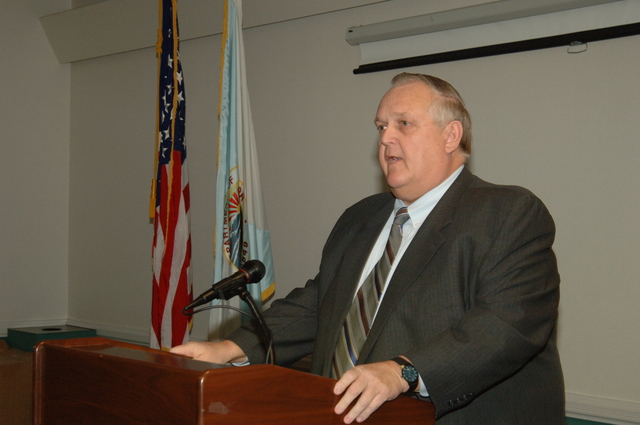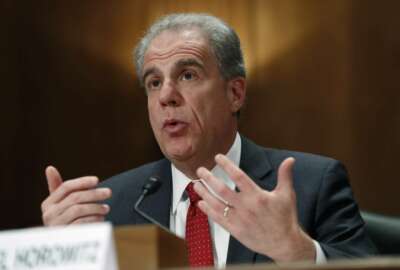Two agency inspectors general got salaries that busted legal limits on political employee pay
The inspectors general for two intelligence agencies were each overpaid by tens of thousands of dollars between 2016 and 2020.
Editor’s Note: The NSA IG mentioned in the report and in this interview, Robert Storch, told Federal News Network that the day ofter he learned of the cost-of-living adjustments he received, he repaid them with a personal check for $17,595.13. Storch says he was not consulted on the increases, and declined to seek a waiver to keep them.
Best listening experience is on Chrome, Firefox or Safari. Subscribe to Federal Drive’s daily audio interviews on Apple Podcasts or PodcastOne.
The inspectors general for two intelligence agencies were each overpaid by tens of thousands of dollars between 2016 and 2020. That’s according to an internal Defense Department memo a whistleblower supplied to Empower Oversight, an outside watchdog group. There’s no clear evidence anyone intentionally did anything wrong. There’s also no evidence the money’s been repaid or whether the matter has been properly investigated. Jason Foster is founder and president of Empower Oversight. He spoke with Federal News Network’s Jared Serbu on the Federal Drive with Tom Temin about what we know and don’t know.
Interview transcript:
Jason Foster: The memo was provided to the DoD inspector general’s office and it walks through the relevant legal authorities for inspector general pay because inspector general pay is set by statute. And inspectors general are senior officials who are subject to a pay freeze and so the memo went through and concluded and reported findings to the DoD IG that these two inspectors general at NSA and NRO had been, according to this official at DoD, overpaid the amounts of approximately $18,000 total for one of the IGs and approximately $150,000 total for the other IG. And this is over a multiple-year timeframe.
Jared Serbu: And you’re fairly confident at this point that that memo is authentic, even though it was not provided to you from an official source of any kind?
Jason Foster: Yes, so we attached a copy of the memo to our FOIA requests to all the agencies that we asked about it. And in our FOIA request, we explicitly said that we had received it from an anonymous source and couldn’t independently authenticate it. However, since we sent those FOIA requests we were contacted by multiple other sources, who did authenticate the memo who we know who they are, and they are in a position to know that it’s an authentic memo.
Jared Serbu: And I believe you’ve seen a response from the NSA IG that basically just indicates this was a clerical error that he knew nothing about at the time. Anything similar from NRO, so far?
Jason Foster: No, we’ve had no contact from NRO. And I would note just that the amount for the NRO IG, the total amount of the alleged overpayments is much higher, it’s much more significant than with the, in one case, it was just the NSA IG got a cost of living increase that the DoD memo says he wasn’t entitled to. However, with the NRO IG, you’re talking about overpayments of over $40,000 a year for several years totaling about $150,000.
Jared Serbu: Yeah, can you unpack that one, maybe a little bit more? Because that one, it looks as, for one thing it spans over more years than the NSA IG overpayments did. But also it looks in that case as though the official started at a higher salary than would have been entitled to under law and then continue to get increases year after year after that.
Jason Foster: Yeah, that’s exactly correct. So we lay out the numbers from the memo in our FOIA request. And, you know, this is, again, the these are approximate and we don’t have access to the underlying records. We just have the summary memo that the DoD provided to the DoD IG. And you know, according to that memo, the overpayments were about $5,000 in 2016; about $20,000 in 2017; about $38,000 in 2018; about $40,000 in 2019; and about $45,000 in 2020. I mean, this is significantly above the level at what an executive level, I think it’s executive level three, I think is the pay cap for a presidentially appointed inspector general.
Jared Serbu: I know you said you’ve not gotten any official responses from NRO yet, but is there any document in your possession or anything that you’ve seen that would lead you to come up with some reason why this might have happened in that case?
Jason Foster: I mean, I have a little bit of insight, again, from sources who contacted me after we sent the FOIA request as sort of what the backstory was. When this memo came over to the DoD OIG, they then referred it to the Council of Inspectors General Integrity Committee (CIGIE), which is sort of the self-policing body for inspectors general, to see if there was any potential investigation that body ought to do. I don’t know whether they also informed the White House or Congress or anyone else, but it’s because the DoD IG is the one who referred it to the integrity committee, there were concerns about potential retaliation if, because the NSA IG is the nominee to be the new DoD IG, right? And so it’s the office that he would be taking over where people had, just doing what they thought was their duty, referred it for potential inquiry. And we raised questions about why the integrity committee didn’t look at it, and how can this not have been elevated to responsible people in the political branches, either in Congress or the White House and sort of how, it’s just sort of perplexing, like, how could this happen without anybody knowing, and without it being public? You don’t have accidental pay raises going to other IG’s and I don’t know if it’s because they’re national security components. And so there’s just not as much transparency or what the explanation is.
Jared Serbu: Let’s unpack that CIGIE piece a little bit, I think the allegation in your original whistleblower communication was not only was CIGIE aware that these overpayments had happened and didn’t really do any kind of investigation, but may have also alerted the people who would have been the subjects of the investigation. Is that right?
Jason Foster: That’s correct. So the source who provided the memo to us also alleged that in CIGIE meetings, there was essentially a heads up to the other IGs and said, “Hey, this is something that came in to the integrity committee, and you should double check and make sure your houses there in order, right? Basically, there’s going to be scrutiny on this.” So there was, like I said, essentially, a heads up to everyone to make sure that they weren’t in a similar position.
Jared Serbu: I want to stress I don’t think there’s really any hard evidence at this point that there was any impropriety on the part of CIGIE or, frankly, anyone else at this point because we just haven’t seen the documents yet. But does this kind of structure give you any kind of pause just in terms of how inspectors general are overseen? It is really, as you said, really just a self policing body where the inspectors general themselves are really the only oversight they have other than each of their respective agency directors, or am I missing something?
Jason Foster: Right, and Congress, right. I mean, and technically CIGIE, there’s an OMB official who is part of CIGIE by statute. So that’s supposed to be the line of oversight to the White House. But again, with my background and working years and years on issues around the IG community from Capitol Hill, my concern is there needs to be transparency and oversight and questions being asked from Capitol Hill about these things. I mean, this is ultimately, the structure, as you said, it is largely a self-policing structure. The integrity committee itself, the NSA IG was the vice chair of the integrity committee at the time this report came in and so had to recuse himself. My understanding is he did properly as I would expect, he recused himself from any consideration of this particular matter. But the standards are very opaque and vague as to what the integrity committee will open an investigation on and what it won’t open an investigation on. And there has been a lot of dissatisfaction on Capitol Hill over the years with the integrity committee’s performance. It seems to be either too aggressive in some cases for some reasons and not aggressive enough in other cases. And there’s no sort of coherent explanation for why they will open up an investigation on some and not open investigations on others. And my argument from the time even from when I was on Capitol Hill as a staffer dealing with CIGIE and its leadership was you need to manage this situation, when you have a problem like this, that has the potential to tarnish the reputation of the inspector general community writ large. You need to show some leadership and and make sure that it’s raised to the political branches to deal with, and that folks on the Hill and the folks in the White House know when there’s an issue and can step in and resolve it one way or the other.
Jared Serbu: To the best of your knowledge, is anyone on the Hill actively looking into this?
Jason Foster: We published an update to our press release that included questions for the record from Sen. Josh Hawley (R-Mo.), who had asked the NSA IG about the overpayments in the course of his confirmation proceedings, because he’s the nominee to be the new DoD inspector general. And so that’s the only one where I know we were provided a copy of the answer that the NSA inspector general provided to Sen. Hawley’s office in response to that question for the record. But I know that that nomination hasn’t moved forward in the last several weeks and that there were attempts to hotline it, and to have it passed by UC and that that hasn’t occurred yet.
Jared Serbu: Just one more question on transparency. Beyond transparency around policy, is what you call it opaque a second ago, what else could or should CIGIE be doing to make the whole process that they run more transparent, and as you said, increase that or maintain that level of trust that everybody needs to have in the IG community?
Jason Foster: Well, we tried to impose some of that transparency back in 2016, when I worked on the IG empowerment act, and we had, there were dissatisfaction then on both sides of the aisle about the speed with which integrity committee investigations were being completed. And we passed at that time, a reporting requirement that said that when the integrity committee has an investigation on an IG that’s open for more than 180 days, that then you have to send a report up to Congress with an explanation. Well, since I’ve been off the Hill and I’m now in this role in an outside watchdog organization, we actually FOIA’d a whole bunch of those reports. They’re not routinely made public. The statute didn’t require them to make public so if Congress doesn’t post them or put them out, then nobody sees them. And when we got them, we were sort of shocked by how little information is actually in them. So they’re constantly punting on these investigations. They stay open for extremely long periods of time, and then they send these perfunctory reports up to Congress technically satisfying the statute, but really not telling you much about why it’s taking so long. There were some people who wanted, who had argued for actual caps with requirements that look, you got to finish this investigation within X amount of time or something, some kind of consequence occurs. But they fought that, and we sort of had this compromise of the reporting requirement. But it doesn’t seem to be doing much. So I know that there’s talk among good government groups on the outside across the ideological spectrum about readdressing integrity committee reforms, because nobody seems to be happy with the progress on either side.
Copyright © 2025 Federal News Network. All rights reserved. This website is not intended for users located within the European Economic Area.
Tom Temin is host of the Federal Drive and has been providing insight on federal technology and management issues for more than 30 years.
Follow @tteminWFED






